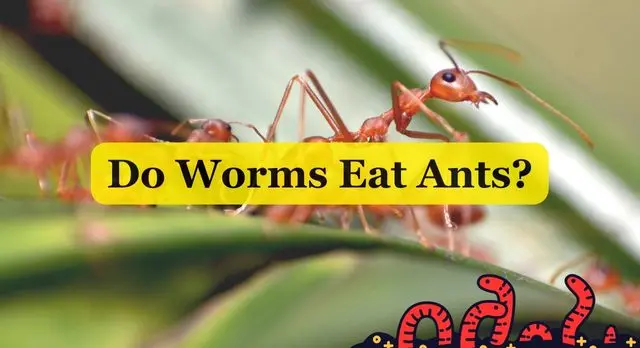Do Worms Eat Ants? Relationship Between Worms and Ants
Worms and ants are both small creatures that have a significant impact on the environment. While worms are known for their role in soil health and decomposition, ants are recognized for their intricate social structures and ecological contributions. In this article, we will explore the relationship between worms and ants, specifically focusing on whether worms eat ants.

The Role of Ants in Ecosystems
Ants are highly social insects that are widely distributed across various ecosystems. They play crucial roles in seed dispersal, soil turnover, and pest control. Ants are known to scavenge and consume a variety of food sources, including dead insects, nectar, honeydew, and seeds. They contribute to nutrient recycling and influence plant growth through their foraging activities.
Can Worms Eat Ants?
While worms primarily feed on decaying organic matter, there is limited evidence to suggest that they eat ants. Earthworms, in particular, are not known to be voracious predators of live insects, including ants. Their feeding behavior focuses more on consuming decomposed organic matter rather than actively hunting or consuming live prey.
Interactions Between Worms and Ants
In the natural environment, worms and ants coexist and interact in various ways. Both creatures occupy different ecological niches and contribute to nutrient cycling and soil health. Ants may scavenge on decomposing organic matter that worms have partially broken down, and worms may benefit from the activities of ants, such as the dispersal of seeds or aeration of the soil.
Benefits of Worms Eating Ants
While worms may not rely on ants as a primary food source, there are potential benefits to worms consuming ants. Ants are rich in protein, and their decomposition can contribute to nutrient availability in the soil. If worms occasionally consume dead ants, it can aid in the breakdown of their bodies and contribute to the nutrient cycle.
Factors Affecting Worms’ Consumption of Ants
The consumption of ants by worms, if it occurs, may be influenced by various factors. These factors can include the availability of other food sources, the abundance of ants in the environment, and the specific species and behavior of the worms. Further research is needed to understand the extent and frequency of worms eating ants and the factors that influence this behavior.
Considerations and Limitations
While the topic of worms eating ants is intriguing, it is important to note the limitations and complexities of studying such interactions in the natural environment. The behavior of worms and ants can vary based on species, environmental conditions, and other factors. Controlled laboratory studies and field observations are valuable in gaining insights into these dynamics but may not fully reflect natural scenarios.
Conclusion
In conclusion, worms primarily feed on decaying organic matter rather than actively consuming live insects like ants. While there is limited evidence to suggest that worms eat ants, their interactions in the natural environment are more diverse and complex. Worms and ants contribute to soil health and nutrient cycling through their respective roles, with ants playing a significant part in seed dispersal and soil turnover. The specific dietary preferences and behaviors of worms and ants vary among species and environmental contexts.
Key Takeaway
- Worms are detritivores that primarily feed on decaying organic matter.
- Ants have diverse dietary preferences, including insects, nectar, fruits, and seeds.
- While worms may not rely on ants as a primary food source, occasional consumption of dead ants can contribute to nutrient cycling.
- Interactions between worms and ants in the natural environment are complex and influenced by various factors.
- Further research is needed to fully understand the extent and frequency of worms eating ants and the factors that influence this behavior.
Understanding the interactions between worms and ants contributes to our knowledge of ecosystem dynamics and highlights the intricate connections between different organisms. Embracing the complexity of nature enriches our appreciation for the fascinating world around us.
Related Article
